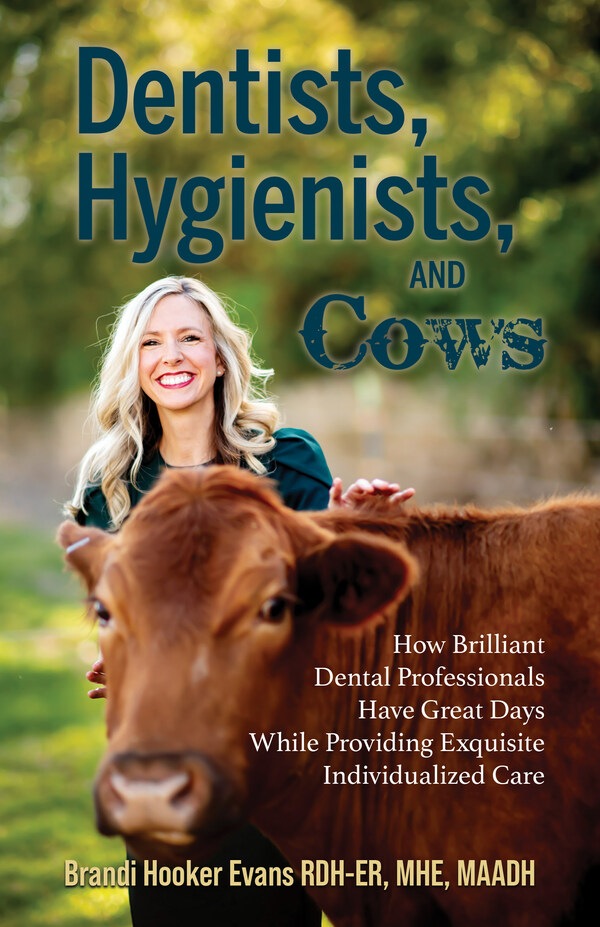Startling statistic: Nearly half of the Earth’s adult population struggles with oral infection, and for many it will be fatal. For seniors, the number jumps to seven out of ten.
“For the first time in history, more people are dying from chronic rather than communicable diseases,” says Brandi Hooker Evans, author of Dentists, Hygienists and Cows: How Brilliant Dental Professionals Have Great Days While Providing Exquisite Individualized Care (2024, Indie Books International.)

“It’s a sad truth that we dental professionals often approach patient care like we’re herding cattle,” says Hooker Evans, RDH-ER, MHE, MAADH. “In our haste to get as many patients processed as possible we can overlook individual needs.”
In her book she makes the case patients and dental professionals should strive for a total body health approach to dental care.
Hooker Evans presents a light-hearted yet serious look at dental care that is infused with a humorous style and can be appreciated by both dental patients and professionals.
“We will have to dig deeper, instrumentation pun intended, if we want to make a true impact and help our patients finally get healthy,” writes Hooker Evans.
Hooker Evans acknowledges most people are not excited about dental appointments.
“When my patients show up to their hygiene appointment, I meet them where they’re at,” says Hooker Evans. “I hope that they will be ready to attempt the next level of health. However, if they aren’t, it’s a big fat freaking high five for showing up today.”
Hooker Evans is an American Academy of Dental Hygiene accredited continuing education provider. Hooker Evans acquired her formal education from Idaho State University, most recently, a master’s degree in health education. She has served as president of the Idaho Dental Hygienists’ Association and her local Portneuf Valley Dental Hygiene Society.
The book quotes this startling statistic from a CDC report: “In 2013, 47.2 percent of adults 30 years of age and older had mild, moderate, or advanced bone loss (aka periodontal disease), as did 70.1 percent of adults 65 and older.“
As a result, a thorough dental exam is required. As Hooker-Evans describes, much of the exam is performed and can be explained in simple terms by the dental hygienist. Here are five steps that might save a patient’s life.
Medical history and update. Advise the patient: “Your mouth is connected to your body. If we know what we are working with, I can help you take great care of both.”
Blood pressure reading. Explain that heart disease and gum disease are often related. They can help or hinder one another.
Oral cancer screening. If the patient asks for more information, she gives it to them. For example: “I am feeling for lumps and bumps. I want to know what is normal for you and if there is anything that we need to investigate further. I have helped a lot of people identify thyroid issues early. No matter what we find, the earlier we discover it, the better outcomes are.”
Radiographs. She teaches hygienists to advise patients: “This thick white line of bone should go up, over, and down between each tooth.”
Periodontal charting. She teaches hygienists to advise patients: “One to three millimeters is normal, and healthy gums don’t bleed or hurt while I measure.” Many patients do not know they can die from diseases that start in the mouth.
“When the assessment is complete, we sit the patient up and review the information together,” Hooker Evans states. “Nine times out of ten, our patient will ask, ‘What are we gonna do?’ To which I answer, ‘We know just what to do! We are a team and are going to treat this disease. It will require you, the patient, and I, the dental professional, to work together with a new plan moving forward for home care as well as professional care.’ A well-informed patient who agrees with the need for the treatment plan is the goal of every exam.”
She says the work hygienists perform and the system they use must come from a place of abundance and service.
She advises hygienists: “Another reason to get comfortable with recognizing and treating periodontal disease early is that it will never be more affordable or easier to treat than it is today.”
In her training and consulting business, Stellar Outcomes, Hooker Evans specializes in crafting tailored practice improvement programs, integrating restorative and administrative insights to elevate individual dental offices and captivate large speaking audiences alike.
